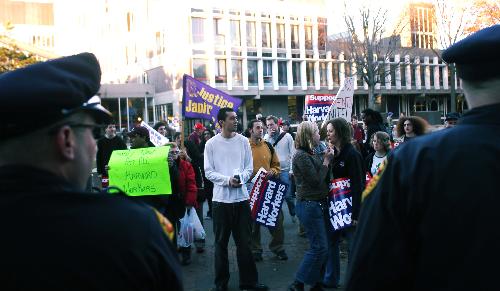
News
Summers Will Not Finish Semester of Teaching as Harvard Investigates Epstein Ties

News
Harvard College Students Report Favoring Divestment from Israel in HUA Survey

News
‘He Should Resign’: Harvard Undergrads Take Hard Line Against Summers Over Epstein Scandal

News
Harvard To Launch New Investigation Into Epstein’s Ties to Summers, Other University Affiliates

News
Harvard Students To Vote on Divestment From Israel in Inaugural HUA Election Survey
Contract Reaches Final Day
Still no agreement on janitors’ wage increases between union, Harvard

With the contract between Harvard’s janitors and the University set to expire at midnight tonight, the two sides remain at odds over potential wage hikes.
During yesterday’s negotiations, Harvard put forward a six-year agreement that would gradually increase janitors’ starting wage to $17 per hour, according to union officials.
But Harvard’s proposal falls short of the union’s last demand, for a raise in the starting wage to $19.50 over five years.
Service Employees International Union (SEIU) Local 615, represents most of Harvard’s janitors. Under the agreement between the University and the union set to expire today, custodial employees in their first three years at Harvard are paid $13.50 per hour.
In addition, the union is seeking a 7 percent wage increase for janitors working the late shift. According to SEIU spokeswoman Courtney Snegroff, Harvard’s latest offer includes the creation of such a “wage differential” but not to the level of 7 percent.
University spokesman Joe Wrinn declined to comment on the specifics of proposals on the table.
SEIU’s current contract arose in the aftermath of a 2001 Mass. Hall sit-in by students. A committee convened after the takeover called for substantial wage hikes for Harvard’s lowest-paid employees and reopened the University’s existing SEIU contract.
If that contract expires tonight with no new agreement, all previously negotiated terms between the janitors and the University will still remain in place, Wrinn said.
Representatives of SEIU would not comment on the likelihood of a strike, but said the union will meet on Thursday to consider the University’s latest offer.
Janitors and student supporters rallied in the Square and at a Harvard Club speech by University President Lawrence H. Summers yesterday in support of their demands. (See story, page 3)
KEEPING UP WITH THE JONESES
Current negotiations are set against a backdrop of disagreements between the University and the union on where Harvard’s wages stand with respect to its peer institutions, how to count the value of its benefits package, and how Harvard is doing in meeting related labor goals.
According to Peter S. Rider, who is leading contract negotiations on behalf of the janitors, the two parties continue to disagree about what constitutes a fair wage for Boston-area workers.
The Student Labor Action Movement (SLAM), a student activist organization that says it represents the demands of the workers, has pushed for a $20-per-hour wage plus benefits for all of Harvard’s custodial employees.
Union representatives criticized Harvard’s notion of fairness.
“I’ve been frustrated because the administration keeps talking about the market as a whole and that their wages fit within the spectrum of the market,” Snegroff said. “But we would expect Harvard not to be in the middle of the market and to be a competitor with the other wealthy institutions.”
“Harvard is the leader when it comes to educating students,” she added. “It should also be a leader when it comes to other services.”
Wrinn called Harvard’s wages competitive, saying they are “in the region of the market.”
“In order to be fiscally prudent, you have to look at the market in being fair and equitable. At the same time, you have to be a good citizen to the community,” he explained. “It’s a balance.”
Wrinn said that the University believes that factors beyond direct compensation should be taken into account in considering how Harvard stacks up.
“We set our wages through the collective bargaining process, but it is also important to remember that total compensation includes other things besides wages, such as health care plans,” he said.
The University and SEIU disagree over how to calculate the value of these benefits.
According to Rider, the union counts only 50 cents per hour worth of health benefits in arriving at a net wage to be used for comparisons with peer institutions. The University arrives at hourly benefit rates in excess of $4 per hour, counting disability, health, dental, and retirement benefits in addition to an adult education program and other services.
WORKING FULL-TIME
Among other disagreements between SEIU and the University is how well Harvard is doing in meeting a contractual goal to increase the proportion of janitors working full-time to 60 percent, Snegroff and Rider said.
According to Wrinn, 49 percent of Harvard’s custodial employees work 40 hours per week, an increase from 32 percent three years ago.
Citing the SEIU’s dissatisfaction with Harvard’s performance, Snegroff said that the union is now demanding a goal of 70 percent be written into the next contract.
Wrinn said the 49 percent rate represents “good progress” toward the target, but noted that the low turnover rate among Harvard’s janitors makes it difficult to hire more full-time workers. Since the 2002 contract negotiation, annual turnover has ranged from 4.8 percent to 8.7 percent.
“Harvard can’t create a new full-time position until two part-time jobs open up,” he explained.
—Staff writer Candice N. Plotkin can be reached at cplotkin@fas.harvard.edu.
—Staff writer Daniel J. T. Schuker can be reached at dschuker@fas.harvard.edu.
Want to keep up with breaking news? Subscribe to our email newsletter.
